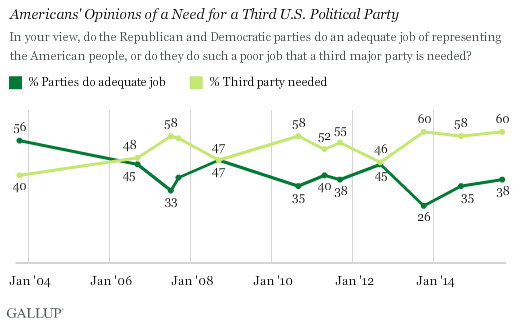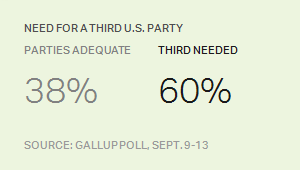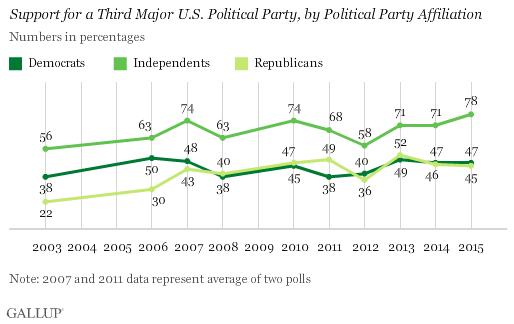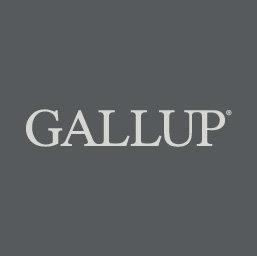Story Highlights
- Six in 10 say third party needed for adequate representation
- Current figure matches high from 2013
- Seventy-eight percent of independents say third party needed
WASHINGTON, D.C. -- A majority of Americans, 60%, say a third major political party is needed because the Republican and Democratic parties "do such a poor job" of representing the American people. This matches the high set in 2013. Since 2007, a majority of Americans have generally called for a third party, with the exception of the last two presidential election years.

These latest results come as both the Democratic and Republican parties are experiencing formidable challenges in the 2016 presidential race from unlikely corners of their ranks, including several candidates who have never been elected to a political office. On the Democratic side, independent Vermont Sen. Bernie Sanders has drawn a large following from left-leaning Americans. In the Republican nomination contest, real estate mogul Donald Trump has rocked his GOP competitors with personal attacks and unconventional political statements, and Dr. Ben Carson and former business executive Carly Fiorina are now among the front-runners for their party's nomination. None of these candidates has said they will seek a third-party bid for the presidency if they don't receive the nomination, but their popularity supports the idea that Americans may be willing to consider candidates outside of the pool of typical politicians.
Americans have been warm to the idea of a third party for at least a decade. When Gallup first asked whether a third party is needed in 2003, four in 10 Americans said it was. The figure climbed in subsequent polls, reaching a majority of 58% in 2007. With the exception of presidential election years in 2008 and 2012, majorities of 52% to 60% of Americans have said a third party is needed to address the inadequacies of the Republican and Democratic parties.

Meanwhile, 38% of Americans in the Sept. 9-13 Governance poll say the two major parties do an adequate job -- up from a low of 26% in 2013. However, this is markedly down from 2003, when more than half of Americans (56%) said the two major parties were representing the public adequately. Underscoring this dissatisfaction, less than 40% of Americans said they had a favorable view of either party earlier this year.
Nearly Four in Five Independents Say Third Party Needed
Perhaps unsurprisingly, Americans who identify politically as independents have consistently been most likely to say a third party is necessary. Majorities of independents in every poll since 2003 have had this view, ranging from a low of 56% in 2003 to a high of 78% in the latest poll.

Republicans and Democrats have, for the most part, been about equally likely to voice a preference for a third party, with the percentage in favor of a third party for each group usually less than a majority and well below the percentage of independents.
There have been a few times in the past when one party's supporters were more likely than the other's to believe a third party was necessary. In polls from 2003 to 2007, during Republican George W. Bush's presidency, Democrats were far more likely than Republicans to say a new major party needed to emerge, but the differences between the two groups settled thereafter. In 2011, however, on the heels of the rise of the Tea Party movement, Republicans were 11 percentage points more likely than Democrats to see a third party as necessary.
Bottom Line
Arguably, the U.S. political climate has been ripe for the emergence of a major third party for some time, but that hasn't yet happened.
So far during this election cycle, Americans may be instead expressing their frustration with the parties by supporting candidates such as Sanders, Trump, Carson and Fiorina. The lack of major third party candidates in recent years in part reflects the difficulty such candidates have in obtaining ballot access in the 50 states, securing a place in the debates and raising sufficient funds outside of the traditional two-party system. Businessman Ross Perot, however, had the personal resources to mount an independent campaign in 1992, and ended up with nearly 19% of the popular vote. It is always possible that a similar type of candidate could emerge to tap into the underlying sentiment and become a force with which the two major parties would have to contend.
Historical data are available in Gallup Analytics.
Survey Methods
Results for this Gallup poll are based on telephone interviews conducted Sept. 9-13, 2015, on the Gallup U.S. Daily survey, with a random sample of 1,025 adults, aged 18 and older, living in all 50 U.S. states and the District of Columbia. For results based on the total sample of national adults, the margin of sampling error is ±4 percentage points at the 95% confidence level. All reported margins of sampling error include computed design effects for weighting.
Each sample of national adults includes a minimum quota of 60% cellphone respondents and 40% landline respondents, with additional minimum quotas by time zone within region. Landline and cellular telephone numbers are selected using random-digit-dial methods.
View complete question responses and trends.
Learn more about how Gallup Poll Social Series works.

